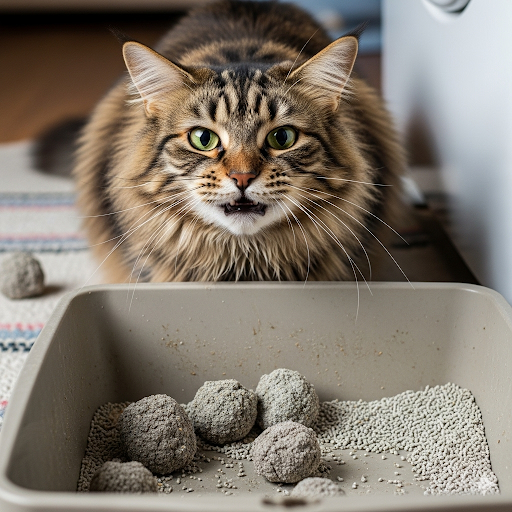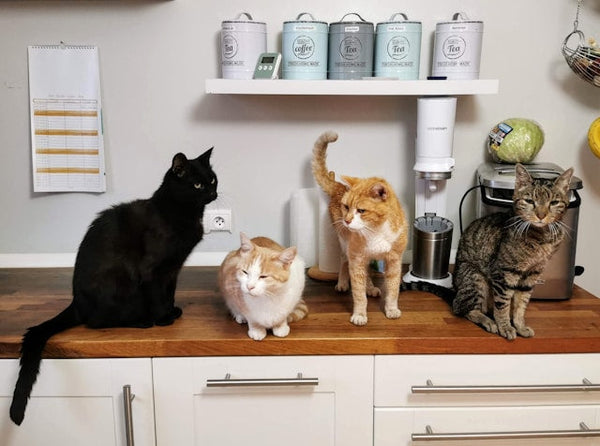
Did you know that a cat's cough is different from ours and can sometimes resemble asthma? Hearing your cat cough occasionally can be a bit concerning, but the good news is that most of the time, it’s nothing to worry about. Cats, like us, sometimes experience minor health issues, and coughing is one way they communicate something might be off. In this blog post, we’ll explore some common reasons why cats cough, how you can identify the cause, and when it's a good idea to visit the vet.
1. Hairballs
One of the most common reasons cats cough is to clear a hairball.
Cats are meticulous groomers, often licking their fur to stay clean. During this grooming process, they ingest loose hair, which can accumulate in their stomachs. When there’s too much, they may cough to expel it. You’ll likely hear a little "hacking" sound, followed by the regurgitation of a hairball. While hairballs are normal, some cats might need a little extra help in clearing them out.
What you can do:
Regular brushing helps minimize the amount of hair your cat swallows. If your cat seems to be having trouble with hairballs or experiences frequent coughing, brushing them more often can help. And if the coughing persists, a quick vet check is always a good idea!
2. Allergies
Just like humans, cats can have allergies that affect their respiratory system, sometimes causing them to cough. Common allergens include pollen, dust, mold, and even certain fragrances or foods. When your cat encounters these irritants, it may lead to inflammation in the airways, triggering a cough.
What you can do:
If your cat has a cough along with other signs like sneezing or watery eyes, it may be worth considering environmental changes. New cleaning products, plants, or other pets might be potential triggers. A visit to the vet can help determine the cause, and they may recommend simple treatments like antihistamines to ease the symptoms.
3. Respiratory Infections
Cats are susceptible to upper respiratory infections (URIs), which are often caused by viruses like feline herpesvirus or calicivirus. These infections are common, especially in young or shelter cats, and can cause symptoms like coughing, sneezing, nasal discharge, and a decrease in appetite.
What you can do:
If your cat's cough is accompanied by other signs such as nasal congestion, lethargy, or reduced eating, a trip to the vet is important. Most respiratory infections in cats can be treated with medications or supportive care to help your kitty feel better.
4. Asthma
Asthma is a chronic condition that affects a cat’s airways, causing them to become inflamed and leading to coughing and wheezing. Feline asthma is more common in older cats, and certain environmental triggers, such as dust, smoke, or even strong smells, can worsen it. While asthma can make your cat’s breathing more labored at times, many cats with asthma can still live comfortably with the right treatment.
What you can do:
If your cat’s coughing seems more intense or is accompanied by labored breathing or wheezing, it might be asthma. A vet can help confirm the diagnosis through tests like X-rays. Fortunately, asthma is manageable with medication such as inhalers or oral treatments, and many cats live happy, active lives once their symptoms are controlled.
5. Foreign Objects or Irritants
Sometimes a cat may cough because something is irritating their airways, such as dust, smoke, or even a small foreign object like a piece of string. If your cat is exposed to environmental irritants, it may cough to clear its throat. If they’ve been chewing on toys or playing with string, the cough might be their way of trying to expel something caught in their throat.
What you can do:
If your cat is coughing after playing with a particular item, like string, or has been exposed to an irritating environment, the cough should subside once the irritant is gone. However, if the coughing doesn’t stop, or if you suspect your cat may have ingested something it shouldn’t, it’s always best to consult your vet for peace of mind.
When to See a Vet
If your cat’s coughing is occasional and doesn’t seem to be affecting their overall well-being, it’s likely not cause for concern. However, if the coughing becomes frequent or is accompanied by other symptoms like reduced appetite, lethargy, or difficulty breathing, it’s time to reach out to your vet. Cats can’t tell us exactly what’s wrong, so it’s always better to be safe and have a professional assess their health.
Conclusion
Most of the time, coughing in cats is perfectly normal and can be attributed to harmless causes like hairballs or minor irritants. With a little attention and regular care, you can help prevent coughing episodes and keep your cat comfortable. However, if the cough seems persistent or severe, it’s always a good idea to consult with your vet to ensure your cat stays happy and healthy.



